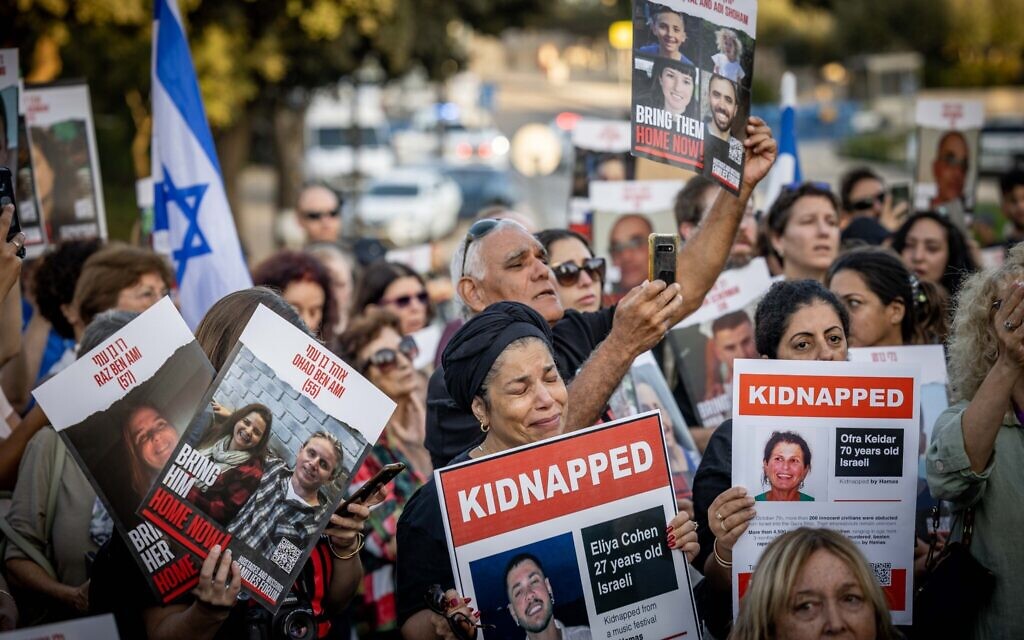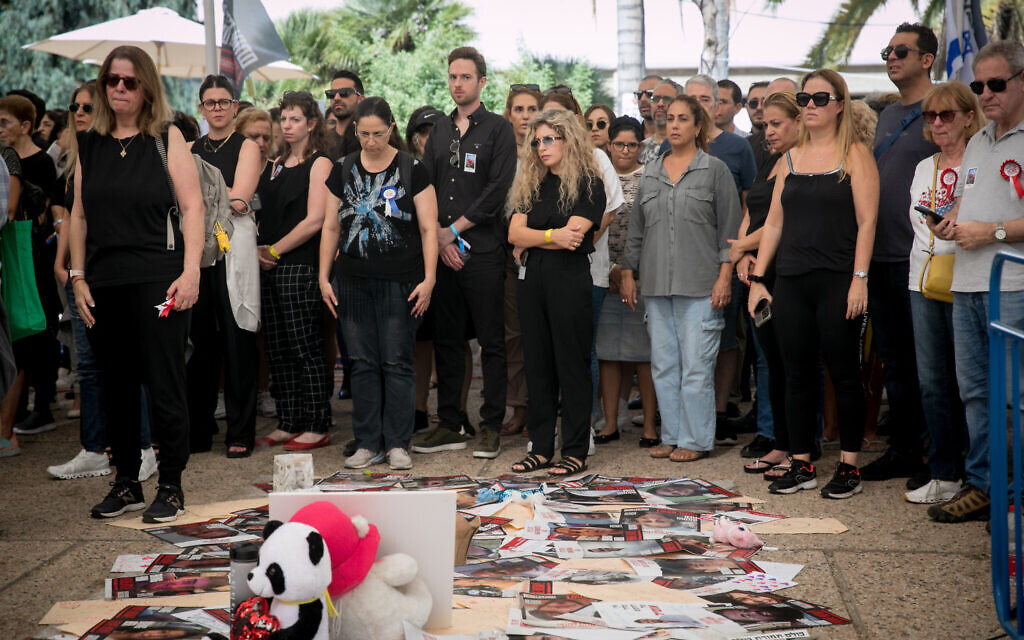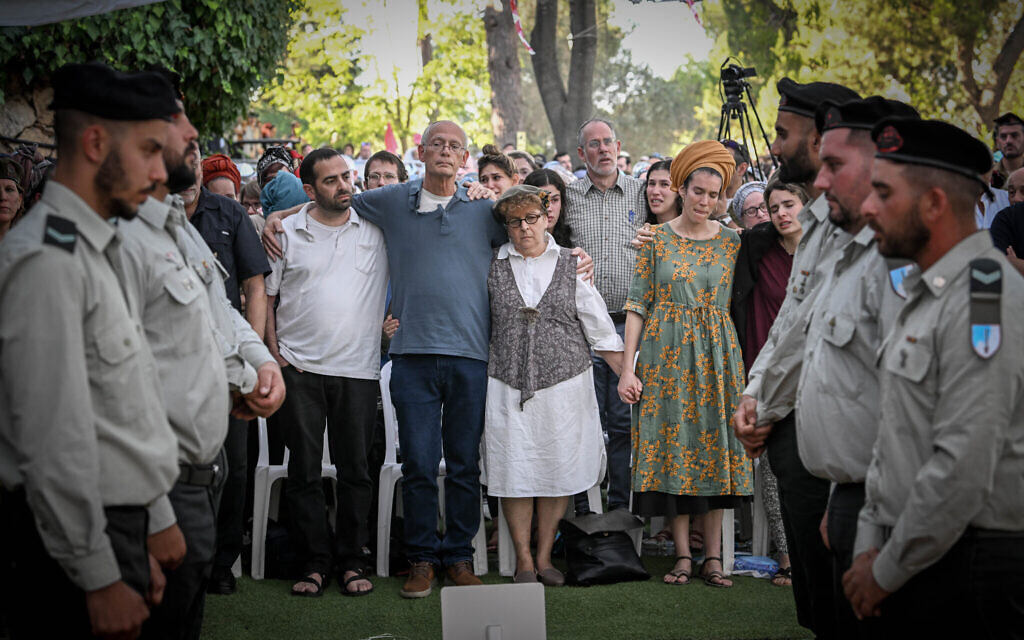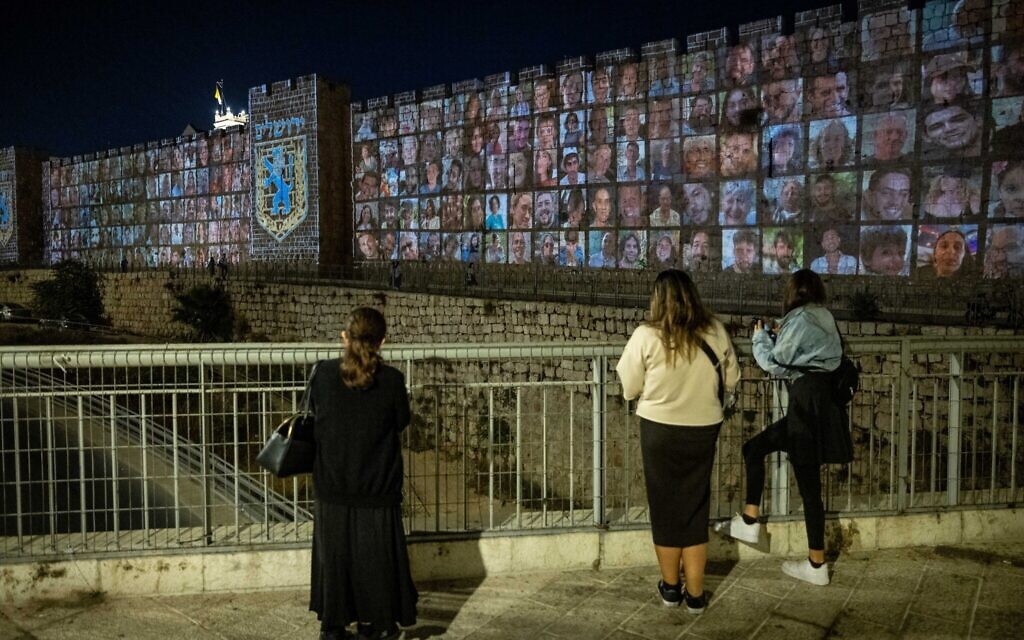A month ago, our world turned upside down.
A month ago, the Israel that we had lived in until October 7 died.
A month ago today, a new Israel was born.
What it will come to look like is something we cannot imagine yet. But of one thing there is no doubt: the trauma of the Black Shabbat will leave the deepest of scars in the soul of this new nation. For decades, it will shape Israel’s character, its politics, the relations between its people, between its people and its enemies, between its people and the antisemites and Israel-hating Nazis around the world.
Just moments before, we were poring over the diaries and the cabinet protocols from the 1973 Yom Kippur war. How could they not have seen what was about to happen? How could they have been so blind? How could they have been so arrogant, so contemptuous of our enemies and their capabilities? How could they have been so complacent as to think themselves invincible and capable of bending the Middle East to their will? It was truly incomprehensible.
Get The Times of Israel's Daily Editionby email and never miss our top stories
By signing up, you agree to the
termsAnd then, on October 7, at 6:30 in the morning, we were awakened. And since then, we comprehend far better.
***
Even now, after a month, the precise scale of the disaster is still not fully known to us.
The numbers aren’t final. We still use words like “at least” and “about.”
About 1,400 murdered, including babies and children, the elderly, foreign workers, soldiers, police, members of the Shin Bet. Not all of them have been identified. Many of them were murdered amid unbearable atrocities, documented and disseminated live on social media by the attackers, to bolster the horror.
Viewing the collection of that monstrous material put together by the IDF Spokesman, some of it from the exultant murderers’ bodycams, is already replacing the Yad Vashem Holocaust memorial visit as the experience that all official visitors to Israel are asked to take part in so they can understand Israelis’ soul.
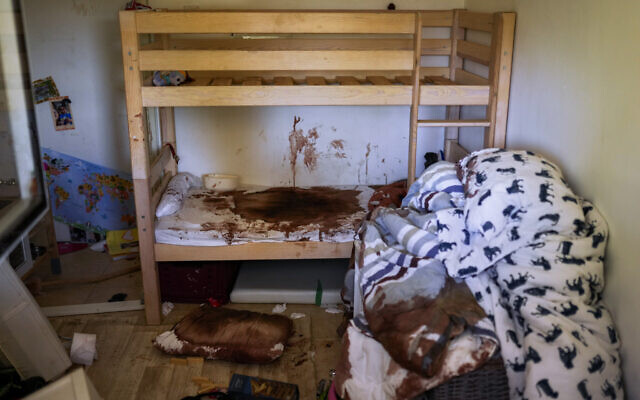
Blood is seen splattered in a child’s room following the October 7 Hamas massacre, at Kibbutz Nir Oz, Oct. 19, 2023. (AP Photo/Francisco Seco)
At least 4,834 people were injured on October 7. Dozens of them are still hospitalized.
Over 240 Israelis and foreigners, from babies to octogenarians, were kidnapped to Gaza and have been held captive for a month in unknowable conditions, imprisoned by terrorist organizations.
The Red Cross hasn’t seen them.
Their pictures are being ripped off notice boards in the West by people shouting “Free Palestine.”
More than 120,000 Israelis have been ordered to abandon their homes, compelled to become internal refugees. Many have no homes to go back to. They’ve been burned to the ground.
Communities lie in ruins. Hundreds of thousands of Israelis have joined the ranks of the bereaved, the widowed, the orphaned, the broken, the traumatized, the terrified.
These unthinkable numbers, the unbearable loss, and the waves of sorrow and pain that they created stunned us at first. A vast blind rage grew within us, shaking the land from end to end. That anger shaped the first declaration of war, where one goal was defined: the total elimination of the Hamas regime.
And then many sobered up. And the goal of the war was updated: The total elimination of the Hamas regime, and the return of all the hostages.
Can those two war goals be achieved? Which does the leadership define as more important? There is no answer.
Meanwhile, the air force bombards and the ground forces enter Gaza, and divide its north from its south. More of our soldiers are killed. Hundreds of thousands of Gazans populate tent camps in the south of the Strip.
On foreign TV channels, fresh reports of the ruins in Gaza push aside the atrocities perpetrated against us and further fuel anti-Israel demonstrations and displays of antisemitism in the Middle East, in Europe and in the United States. Jews worldwide report that they have never felt so threatened.
That is in the outside world. We in Israel cannot get past October 7.
The horrors of the outdoor rave where over 260 partygoers were massacred. The families huddling in safe rooms at home as the flames drew closer. The whispers on the telephone to Israeli TV reporters, to somehow “come and save us.” The hostages taken away on motorbikes, being beaten on the way to Gaza.
The pleas for help that never came.
***
A month has passed.
Only a month has passed.
We are still fallen apart, and the reality continues to fall apart.
The Houthis in Yemen are firing missiles that are downed by Saudi Arabia. The United States is sending aircraft carriers and a nuclear submarine. Hezbollah is targeting northern communities evacuated of their residents.
In hotels around the country, you meet refugees who were forced to leave their homes near Gaza. For most of them, their world has collapsed. You see it in their eyes without them saying anything.
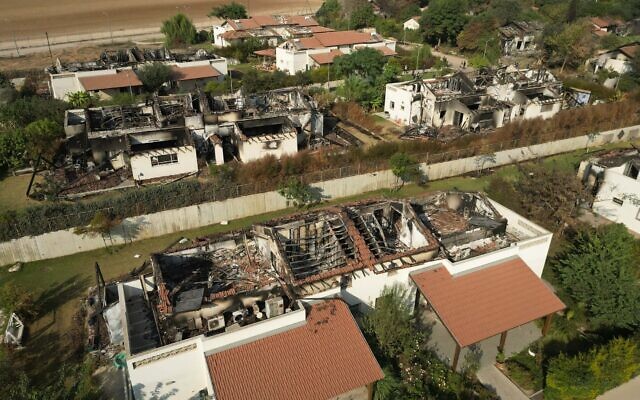
Kibbutz Be’eri after the Hamas massacres, pictured on October 14, 2023 (Arik Marmum / Flash 90)
In the guesthouses of the north, you meet farmers from the border with Lebanon who were forced to leave their fields, and worry about the chicken runs and orchards they’ve left behind.
In the hotels of Netanya and Petah Tikva, you meet crowds of refugees from Ashkelon and Sderot. The facades of these hotels broadcast pre-October 7 luxury. But when you enter, you find yourself in an alternate reality: Noisy. Scared. Crowded. Women face giant washing machines in the basement with baskets full of children’s clothes. Kids hopped up on sugar, running down the corridors.
Nobody knows how long this will last. They’re talking about many months, at least. And nobody can manage to understand what became of the big, strong State of Israel that abandoned them on October 7 and has continued to neglect them since.

Evacuated Kibbutz Be’eri residents at a Dead Sea hotel, October 20, 2023 (Arik Zamir / Flash90)
***
Outside the prime minister’s home in Jerusalem, demonstrators call on him to resign immediately. Right now, in the middle of a war. That, too, is hard to take in.
It is hard to imagine the prime minister of Israel resigning in the middle of a war. Hard to imagine this prime minister continuing to lead the state.
This amazing nation deserves better leadership. That’s what many Israelis have been saying to each other for the past month.
We are no longer able to answer simple questions like “How are you?” and “How’s it going?”
We struggle for the right words. We minimize our pain amid the suffering of others. There are no right words. The right words fell apart on October 7.
What simple summation can describe how we are in the last month?
Once, in the Israel we lived in before October 7, we would answer “sababa,” or “really good.” Who knows when we’ll be able to use those answers again?
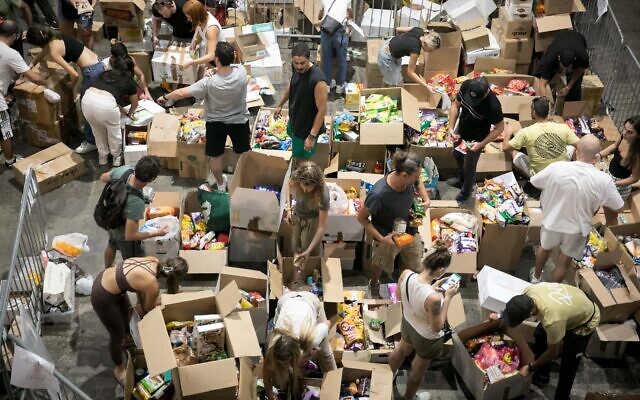
Volunteers pack donations of food and other necessities for Israeli soldiers and citizens in the south, in Tel Aviv, October 9, 2023. (Miriam Alster/Flash9)
In order to keep ourselves going, we grasp hold of volunteerism, solidarity, heroism, innovation, organization, resilience, generosity, the heartfelt embrace of a complete stranger.
The Israeli nation that was born a month ago is already showing characteristics that inspire and offer hope.
—
Translated from the original Hebrew.

